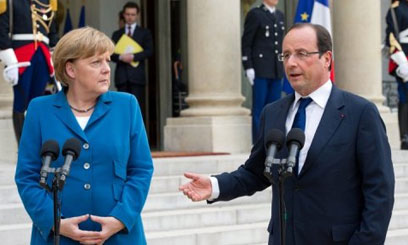
French President Francois Hollande (R) and German Chancellor Angela Merkel speak to journalists before a working diner in Paris, on June 27. EU leaders debate “a big leap forward” to strengthen their union and save the euro at a two-day summit starting Thursday, but divisions may scuttle efforts to bring the currency back from the brink.
© AFP Bertrand Langlois
BRUSSELS, Jun 28 – EU leaders debate “a big leap forward” to strengthen their union and save the euro at a two-day summit starting Thursday, but divisions may scuttle efforts to bring the currency back from the brink.
European Union heads of state and government gather from 3:00 pm (1300 GMT) as the debt crisis, now in its third year, widened this week.
Cyprus and Spain have joined the earlier victims of contagion — Greece, Portugal and Ireland — in requesting aid.
With Italy, the eurozone’s third economy, also threatened, the EU is under pressure from world leaders to deliver a convincing plan to prevent a collapse of the single currency, which would have unfathomable global repercussions.
The summit “is perhaps the most important since the foundation of the EU” 60 years ago, said the head of the global IFF bank lobby Charles Dallara.
“It’s about winning back the trust and confidence of long-term investors,” he told the German weekly, Die Zeit. “I’m afraid they’ll only allow themselves to be convinced by comprehensive solutions.”
The 19th summit since 2010, it has, like others before it, been billed the mother-of-all-summits, a “last chance” for the decade-old euro.
Among short-term solutions is an ambitious pact to kickstart growth by injecting 130 billion euros ($163 billion) into floundering economies currently facing record unemployment of 11 percent.
For the longer term, leaders will be asked to sign on to a roadmap toward tighter economic and monetary union over the next decade, the first step to a banking union to be agreed by the end of this year.
That could satisfy German Chancellor Angela Merkel’s calls for “more Europe, not less Europe”.
Under increasing pressure from her partners in the EU Big Four — France, Germany, Italy and Spain — Merkel warned on the eve of the talks that there were “no quick, no easy” solutions, no “magic formula” to end the crisis.
She flew to Paris late Wednesday for talks with President Francois Hollande in an 11th-hour bid to bridge the gap between Europe’s two biggest economies.
“Unless France and Germany can soon agree on a grand bargain, disaster may loom,” said analyst Charles Grant of the Centre for European Reform.
Hollande has rejected Merkel’s austerity-driven approach to solving the crisis and her insistence that budgetary discipline come before solidarity.
In brief statements in Paris both leaders made conciliatory gestures: Hollande indicated he was ready to discuss further integration — though France is loathe to cede sovereignty to Brussels — while the German chancellor hailed measures to promote eurozone growth.
The new French leader, along with Italy’s Mario Monti, wants to use the eurozone’s 500-billion-euro rescue pot to offer immediate help to Spain’s distressed banks and to buy bonds of virtuous economies whose borrowing costs are soaring due to market pressure.
But Merkel is firmly opposed to throwing money at struggling banks or poorly run economies.
There will be no eurobonds, or pooling of European debt “as long as I’m alive”, she said this week.
But in Spain, the eurozone’s fourth economy, Prime Minister Mariano Rajoy warned that the country could not finance itself for long at the high rates it now pays on the markets.
“There are institutions and also financial entities that cannot access the markets. It is happening in Spain, it is happening in Italy and it is happening in other countries,” he said.
Looking further ahead, EU president Herman Van Rompuy and European Commission president Jose Manuel Barroso will ask leaders to approve “building blocks” towards greater union.
“We need a banking union, a fiscal union and further steps towards political union,” Barroso said.
The banking union would see the European Central Bank tasked with banking supervision across the 17-nation eurozone, with the London-headquartered European Banking Authority overseeing the sector in the 10 non-euro states.
To reassure depositors and insure against bank runs, Brussels is suggesting Europe-wide guarantees on deposits.
It also proposes a so-called “resolution” scheme to close down bad banks.
Brussels suggests that its new rescue fund, the European Stability Mechanism (ESM) — to come into being in July — could act as the backstop to both the deposit guarantees and resolution authority.
This would enable the ESM to directly prop up distressed banks, as Spain is currently requesting, and keep debt off sovereign books.
But Berlin wants the loans to go through governments to have a say in how money is spent.
Barroso on Tuesday called the simmering eurozone crisis “the biggest threat to all that we have achieved through European construction over the last 60 years.
“Faced with this stark reality, standing still is not an option. A big leap forward is now needed.”



































